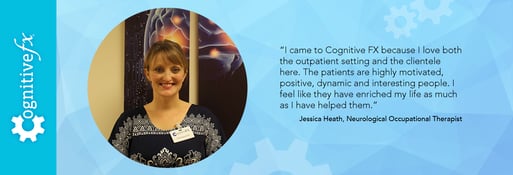Journaling Techniques and Ideas After a Brain Injury
Journaling is one of the greatest therapeutic techniques available. Journaling is free, confidential, and convenient. It offers you the opportunity to be your own therapist. You might think...

Past patient, Anna Empey shares her experiences in a series of blog posts including "Perspective After a Brain Injury," "10 Things I Wish I had Know Before my Brain Injury," and here in this post.
When I first was recovering, I felt like I couldn’t find words to write about my experience. I couldn’t explain either written or vocally how I was feeling or what I was going through. Over time, writing became something that helped me learn how to gather my thoughts and express myself. I focused more on the act of writing something down rather than if it was written perfectly or exactly accurate. Continually writing helped me find ways to get better at it.
I really got into writing after EPIC Treatment at Cognitive FX, a few years after my first injury. I wanted to find a way to document what I was feeling and learning and experiencing moving forward. It was my own words that were a reminder of things I hoped were or would be true.
At that point, I hoped that my brain was working better. I hoped that I could do and enjoy things that I had previously stopped doing. I hoped that I could find a new normal, and that I didn’t need to limit or undermine myself or my capabilities any longer. I now know these things to be true, and it was through writing a few times a week that I could see and feel the truth for myself. My own words showed me that things were changing, that I was changing, and that my brain was working better.
I started out writing 3 things that I was thankful for that day, I focused on writing a couple times a week. Then I started adding things about my day including what I did, what I felt, and what I learned.
When I journal now it looks something like this:
Today I am thankful for:
Today I:
Today I learned:
Today I felt:
Today I thought deeply about:
How do I use the feeling of fear to encourage me to take an action that actually helps me move forward?
As I looked at each of these aspects over time, my answers started to change. The activities I was doing changed, my emotions changed, and I could see I was making progress and learning new things each day. This practice also shifted my mindset to focus on the small victories. Helping me see and believe that even little steps towards progress are more important than huge steps to progress.
There are many different types of journaling that can be helpful for recovery. Writing in and of itself is something that can help you find new words and explore ways to express yourself. For me, it was a record that helped me see and find changes over time from my own perspective.
For more ideas on journaling we encourage you to check out this article about journaling for recovery here. There is also this article here that talks about 10 ways to journal to aid in healing and growth.

The "Cognitive FX Team" is a collaborative ensemble of distinguished doctors, therapists, and practitioners. Our experts are pioneers in the field of neuroimaging and concussion treatment. With extensive experience and a strong commitment to patient care, our team excels in utilizing cutting-edge technologies, such as functional MRI (fMRI), to provide personalized diagnostic and treatment strategies. Our renowned professionals have published groundbreaking research, developed innovative neuroimaging biomarkers, and conducted thousands of individualized patient assessments. We take pride in our holistic approach to patient care, focusing on physical, cognitive, and emotional aspects of recovery. As leaders in the industry, the Cognitive FX Team is dedicated to advancing the science of concussion diagnosis and treatment to provide our patients with the highest level of care and support.

Journaling is one of the greatest therapeutic techniques available. Journaling is free, confidential, and convenient. It offers you the opportunity to be your own therapist. You might think...

Jessica Heath is a Neurological Occupational Therapist here at Cognitive FX.
Jessica received her degree in Occupational Therapy from the University of Utah. Jessica has mostly worked with...
Published peer-reviewed research shows that Cognitive FX treatment leads to meaningful symptom reduction in post-concussion symptoms for 77% of study participants. Cognitive FX is the only PCS clinic with third-party validated treatment outcomes.
READ FULL STUDYPublished peer-reviewed research shows that Cognitive FX treatment leads to meaningful symptom reduction in post-concussion symptoms for 77% of study participants. Cognitive FX is the only PCS clinic with third-party validated treatment outcomes.
READ FULL STUDY